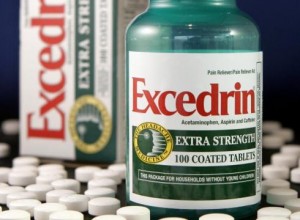Warnings & Recalls for Excedrin
Excedrin Voluntary Recall
January 8, 2012 Novartis notified the
U.S. Food and Drug Administration that all lots of certain bottle packaging of
Excedrin are to be
recalled. Expiration dates on these products are listed as
December 20,2014. These lots were recalled due to the possibility of
stray medicines from other Novartis products or
broken tablets.If you are using
Excedrin, be sure that the product has not been affected.
View the recall list at
http://www.novartisotc.com/AffectedLots.pdf. If you have received a product listed in the recall,
immediately stop using the medicine and contact the
Novartis Consumer Relationship Center by calling 1-888-477-2403.
Excedrin and Stomach Bleeding
Excedrin contains an NSAID and may cause
stomach bleeding. If you are
over 60, have a history of
stomach ulcers, take
blood thinners, have
bleeding issues, or
take other NSAIDs (such as aspirin or ibuprofen)
ask your doctor if it is safe to take Excedrin.
Drinking 3 or more alcoholic beverages per day may
increase your risk for
stomach bleeding.To
decrease the possibility of
stomach bleeding, avoid using
Warfarin while taking
Excedrin.Reye's Syndrome
Excedrin may cause
Reye's syndrome (can affect the brain and liver) if given to a child or teenager who has a
fever,
flu-like symptoms or
chicken pox. Signs of Reye's syndrome include:
- continual vomiting
- changes in mood or behavior
- seizures (convulsions)
- becoming unconscious
- confusion
Contact your healthcare provider if you or your child is suffering from any of these symptoms.
General Warnings
Excedrin is
not listed in any FDA
pregnancy category. However, this medication
may harm the heart of an unborn baby and also lead to a
decreased birth weight. Ingredients in Excedrin
can be passed through breast-milk. Before taking Exedrin, ask your doctor about
benefits and
risks of taking this drug while pregnant or breastfeeding.To avoid
dangerously high heart rates, limit your use any other products containing
caffeine while taking Excedrin.
Do not use Excedrin if you are taking any other medicines containing
acetaminophen.Consult your doctor before using Excedrin if you:
- are having an extremely severe headache or migraine
- are allergic to any ingredient in Excedrin
- have a fever and tense neck
- have liver disease
- are prone to stomach bleeding
- have asthma
- have had problems with taking pain relievers
- are throwing up while having a migraine
- have a headache caused by an injury
- have high blood pressure or heart disorders
- have kidney disease
- have diabetes
- have arthritis
Excedrin Treatment and Use
Excedrin | acetaminophen, aspirin and caffeine is a salicylate (salycilic acid) class drug marketed by Novartis for the use of reducing pain and fever symptoms. Excedrin may also be used to treat swelling and inflammation. Excedrin can reduce pain induced by:
- headaches caused by tension or allergies
- migraines
- the common cold
- cramping during menstruation
- toothaches and mouth sores
- stuffy nose
- some forms of arthritis
- muscle pain or aching
How does Excedrin Work?
Excedrin works through the combination of acetaminophen, aspirin and caffeine. Acetaminophen and aspirin relieve pain by keeping prostaglandins from being produced in the blood. Prostaglandins are responsible for causing symptoms of pain, inflammation, and fever during an injury or illness. Caffeine helps to relax and widen blood vessels to aid in blood circulation and increase the effectiveness of Excedrin.
Excedrin Dosage Information
Excedrin comes in tablets or caplets to be taken orally with water. Take Excedrin exactly as prescribed by your doctor. Eat a full meal with Excedrin to avoid stomach aches. Do not take more than recommended, as an overdose could harm your liver or even be fatal.
Children and teenagers who have chicken pox or flu-like symptoms or are being treated for these illnesses should not use Excedrin. See “Warnings and Recalls” tab for more details.
